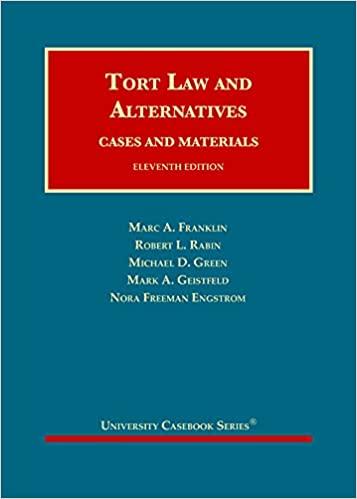Question
KirtsaengVs. John Wiley and Songs The Copyright Act grants certain exclusive rights to copyright owners. See 17 U.S.C. 106. Among those rights is the right
KirtsaengVs. John Wiley and Songs
The Copyright Act grants certain "exclusive rights" to copyright owners. See 17 U.S.C. 106. Among those rights is the right "to distribute copies" of the copyrighted work. Id. 106(3). However, the copyright owner's rights are qualified by limitations set out in 107 through 122, including the "first sale" doctrine. This doctrine, as set forth in 109(a), provides that "the owner of a particular copy or phonorecord lawfully made under this title ... is entitled, without the authority of the copyright owner, to sell or otherwise dispose of the possession of that copy or phonorecord."A separate provision in federal law, 602(a)(1), states that "[i]mportationinto the United States, without the authority of the owner of copyright under this title, of copies ... of a work that have been acquired outside the United States is an infringement of the exclusive right to distribute copies ... under section 106." In Quality King Distributors v.L'anza Research Int'l, 523 U.S. 135, 145 (1998), the Supreme Court held that 602(a)(1)'s reference to 106(3) incorporates the 107 through 122 limitations on copyright owners' rights, including 109(a)'s first sale doctrine. The importer in Quality King therefore was held entitled to invoke the first sale doctrine as a defense. The imported copy at issue in that case was initially manufactured in the United States and then sent abroad and sold.John Wiley & Sons Inc. (Wiley), an academic textbook publisher, often assigns to its wholly owned foreign subsidiary (Wiley Asia) rights to publish, print, and sell foreign editions of Wiley's English-language textbooks abroad. As a result, there are often two essentially equivalent versions of a Wiley textbook (with each version being manufactured and sold with Wiley's permission): (1) an American version printed and sold in the United States and (2) a foreign version manufactured and sold abroad. The books produced and sold by Wiley Asia contain notices stating that they are to be sold only in certain designated nations other than the United States or in certain designated regions of the world outside the United States and that they are not to be taken into the United States without Wiley's permission.SupapKirtsaeng, a citizen of Thailand, was a student in the United States. He asked friends and family to buy foreign edition English-language Wiley textbooks in Thai book shops, where they sold at low prices, and to mail them to him in the United States They did so.Kirtsaengthen sold the books, reimbursed his family and friends, and kept the profits.Wiley suedKirtsaeng, claiming that his unauthorized importation and resale of the books infringed Wiley's 106(3) right to distribute and 602(a)(1)'s import prohibition.Kirtsaengargued that because the books were "lawfully made" and acquired legitimately, 109(a)'s first sale doctrine permitted importation and resale without Wiley's further permission.Are any patent, copyrights or trademark laws violated.
Could you develop a IRAC for this case discussion?
Step by Step Solution
There are 3 Steps involved in it
Step: 1

Get Instant Access to Expert-Tailored Solutions
See step-by-step solutions with expert insights and AI powered tools for academic success
Step: 2

Step: 3

Ace Your Homework with AI
Get the answers you need in no time with our AI-driven, step-by-step assistance
Get Started


